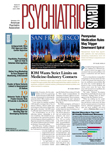After being turned down by the Food and Drug Administration (FDA) almost a year ago, iloperidone has gained approval for the acute treatment of schizophrenia in adult patients.
Iloperidone is a second-generation antipsychotic (SGA) medication mixed antagonism for dopamine D2 and serotonin 5HT2A receptors and is owned by Vanda Pharmaceuticals.
In two randomized, placebo-controlled, phase-3 trials in patients with schizophrenia, iloperidone was found more efficacious than placebo in reducing schizophrenia symptoms among study subjects.
In one trial, 604 patients with schizophrenia received iloperidone 24 mg/day, placebo, or ziprasidone for four weeks, with patients on iloperidone showing significant benefits in Positive and Negative Syndrome Scale total scores compared with placebo. In the other trial, involving 706 patients, iloperidone was compared with placebo and risperidone. After six weeks, the drug was superior to placebo in the reduction of total score on the Brief Psychiatric Rating Scale. At press time, the company had not released any data on how iloperidone compared with either ziprasidone or risperidone on efficacy indicators.
The long-term efficacy and safety of iloperidone have not been studied. In the four-week and six-week trials, the most common adverse reactions included dizziness, dry mouth, fatigue, nasal congestion, orthostatic hypotension, somnolence, tachycardia, and weight gain.
Pooled data from four placebo-controlled clinical trials indicated that about 12 percent to 18 percent of patients on iloperidone—versus 4 percent of those on placebo—gained at least 7 percent of body weight. This amount is generally considered clinically significant. The mean weight change from baseline was 2.0 kg in iloperidone-treated patients and -0.1 kg in placebo-treated patients. Also, pooled data from the four clinical trials did not show notable differences between iloperidone and placebo in terms of blood glucose, total cholesterol, and triglyceride levels. All of these trials lasted four to six weeks and were conducted in adult patients.
Like many other antipsychotics, iloperidone may be associated with QT prolongation, which is linked to increased risk of sudden cardiac death. Potential interactions with drugs that also prolong QT interval or inhibit iloperidone metabolism, as well as electrolyte imbalance, require clinicians to apply caution before prescribing the drug. Also like other antipsychotics, the label of iloperidone contains a boxed warning about increased risk of death associated with using antipsychotics to treat dementia-related symptoms in elderly patients.
According to the FDA-approved labeling, the target dosage of iloperidone is 12 mg to 24 mg per day given twice daily and should be titrated from a dose of 1 mg twice daily. The drug will be available in tablets ranging from 1 mg to 12 mg and marketed under the brand name Fanapt.
Iloperidone's approval came nearly 10 months after the FDA rejected Vanda's new drug application (NDA) for marketing iloperidone, which was originally filed in 2007 (Psychiatric News, September 19, 2008), because the agency questioned the drug's efficacy compared with risperidone in the phase-3 trial. The agency asked Vanda to conduct an additional clinical trial to compare iloperidone with either risperidone or olanzapine, even though one of the two phase-3 trials had compared iloperidone with both placebo and risperidone. The company appealed the agency's decision in a resubmitted NDA last November.
“Vanda provided the FDA with additional data and arguments that led us to reinterpret results of several of their studies, thus convincing the agency that there were sufficient data to support an approval action based on the existing clinical trials,” Karen Mahoney, an FDA spokesperson, told Psychiatric News. The data and review documents supporting the approval will be made public after the documents are approved by the agency's Office of Freedom of Information, she said.
Vanda's survival had hinged on the agency's second-round decision on iloperidone. According to a May 7 press release, the approval of the drug fended off one of its investor's attempt to take over the board and liquidate the company.
In 2007 the FDA rejected the NDA for another new antipsychotic, bifeprunox, developed by Solvay, for a similar reason: the drug showed questionable efficacy compared with currently available SGAs.
The approved label and prescribing information for iloperidone are posted at<fanapt.com/fanapt-pi-may09.pdf>.▪
